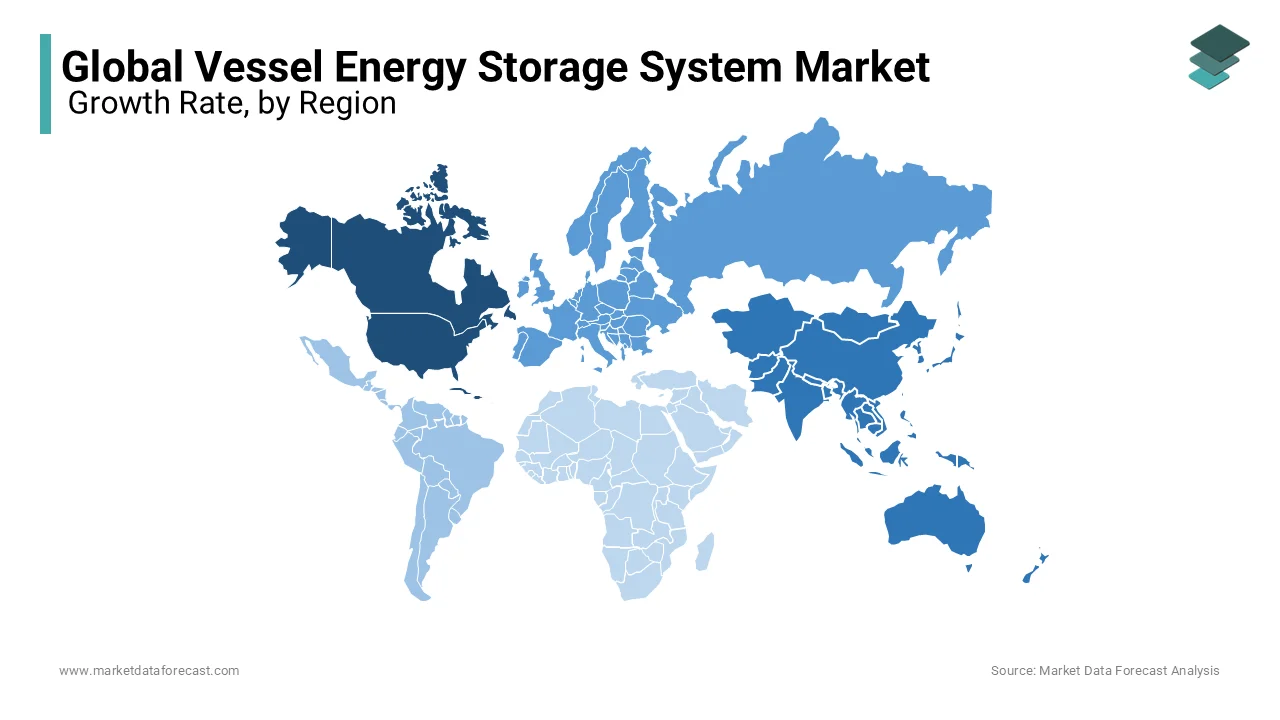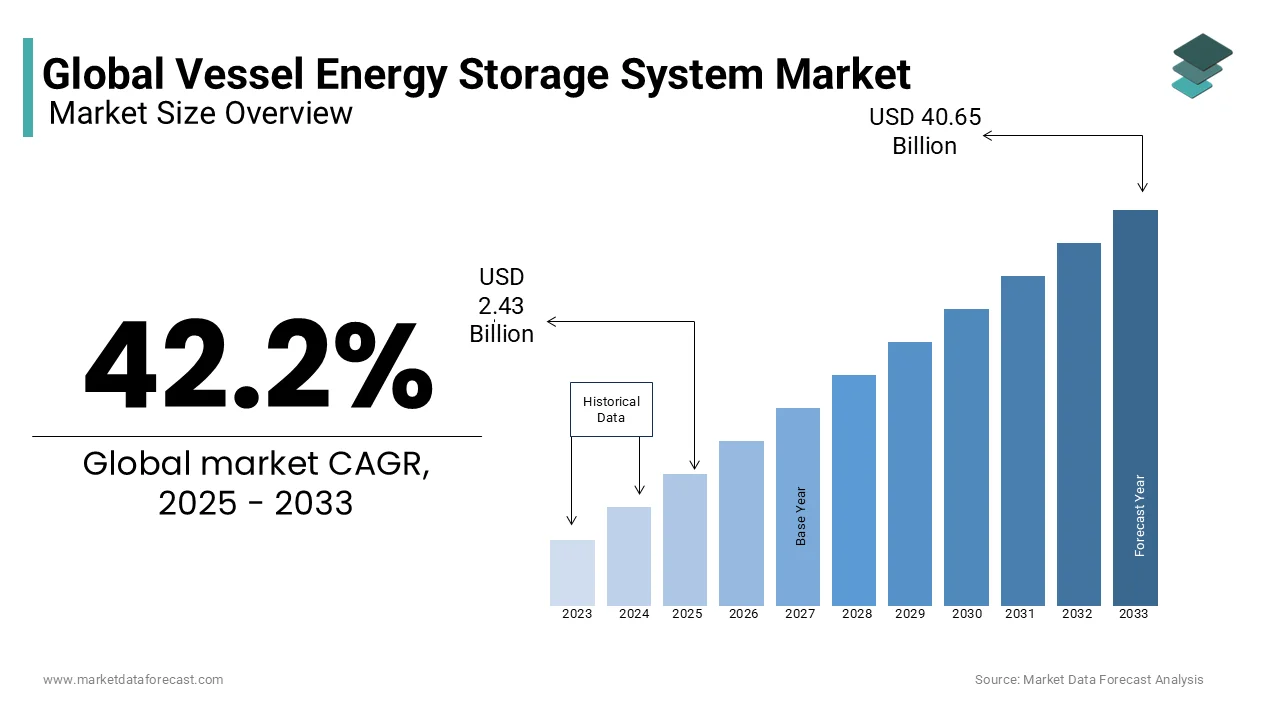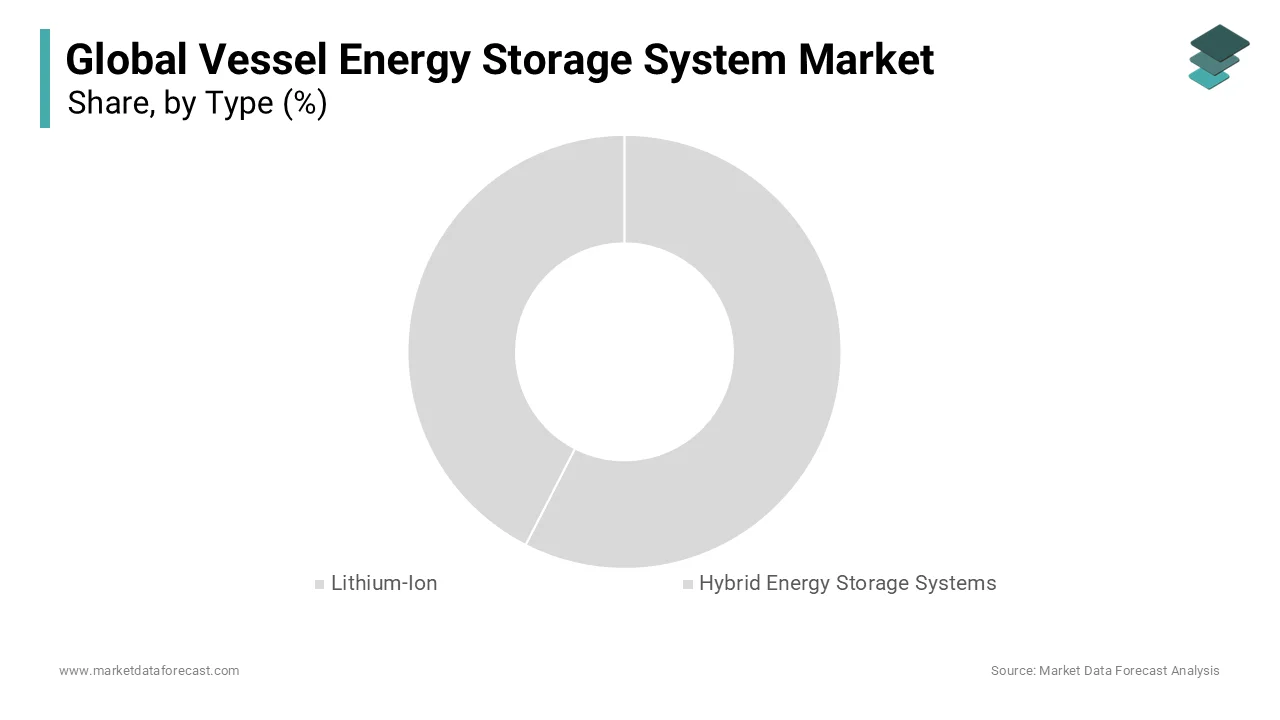Global Vessel Energy Storage System Market Size, Share, Trends & Growth Forecast Report By type (Lithium-Ion and Hybrid Energy Storage Systems), Application (Commercial, Transport, Military and Others) & Region (North America, Europe, Asia-Pacific, Latin America, Middle East and Africa), Industry Analysis From 2024 to 2033
Global Vessel Energy Storage System Market Size
The global vessel energy storage system market size was estimated at USD 1.71 billion in 2024 and is anticipated to reach a valuation of USD 40.65 billion by 2033 from USD 2.43 billion in 2025 and is predicted to register a CAGR of 42.2% from 2025 to 2033.
Energy storage systems or ESS store excess power generation capacity when it is available for its instant post later on the web when needed. Storage cells can include batteries, super/ultracapacitors, or a combination of the two depending on the charge cycle, which is connected to the grid via a bidirectional static electronic power converter. Energy storage is the capture of energy produced at a given time for later use. A device that stores energy is generally called an accumulator or battery. Energy comes in many forms, including radiation, chemical potential, gravitational potential, electric potential, electricity, high temperature, latent heat, and kinetics. Energy storage involves converting the energy in forms that are difficult to store into forms that can be stored more easily or economically. On-board energy storage systems continue to grow in the worldwide market.
MARKET TRENDS
Stringent environmental regulations, escalating pressure to reduce greenhouse gas emissions, and the availability of new technologies in the field of electrical energy storage are pushing the shipping industry to consider alternative technologies and novelties, such as hybrid solutions or total power plants for ship propulsion and power generation.
MARKET DRIVERS
The vessel energy storage system helps shipowners reduce emissions to meet environmental standards and regulations. Increases the responsiveness of the boat, as battery-powered propulsion systems respond instantly. The vessel's energy storage system also helps reduce operating costs by storing and using regenerated energy. Safety levels are also increased due to the reserve of backup power that keeps the system running in the event of failure. The ship's energy storage systems minimize maintenance costs by reducing engine hours. Additionally, the comfort level for crew and passengers increases as vibrations and contamination are eliminated. The system helps ships and shipping companies maintain their ecological profile while escalating the durability of ships. Upcoming technological advancements in storage systems will further increase the expansion of the worldwide marine energy storage systems market during the forecast period.
MARKET RESTRAINTS
Today, the growing concern about environmental pollution and the consumption of fossil fuels has attracted the attention of the transportation industry, especially on ships. The high initial cost induced by the installation of advanced storage systems, together with the limited technical knowledge of companies, is the main factor that can hamper the expansion of the worldwide market for vessel energy storage systems.
MARKET OPPORTUNITIES
The ship's energy storage system powers the entire system, eliminating the need for motors. Quiet operations, zero emissions, and zero fuel consumption are some of the benefits. This minimizes environmental pollution, thus reducing its effect on marine life. The ship's energy storage system absorbs load variations in the electrical grid. The energy storage system manages the power required by the engine and removes the maximum load required to start new engines. Energy can be produced with maximum efficiency and at an economical cost. Growing environmental concerns and restrictions on ship-produced carbon emissions are the main factors driving the expansion of the worldwide market for vessel energy storage systems. The benefits offered and the increased adoption in recent years due to the efficient operation have also fueled the expansion of the worldwide market for ship energy storage systems.
MARKET CHALLENGES
Another major challenge ships face is fluctuations due to high dynamic loads. In order to have good reliability in the onboard power system, various generators continue to operate continuously below their point of efficiency. This leads to serious environmental pollution and inefficient energy operations.
REPORT COVERAGE
|
REPORT METRIC |
DETAILS |
|
Market Size Available |
2024 to 2033 |
|
Base Year |
2024 |
|
Forecast Period |
2025 to 2033 |
|
CAGR |
42.2% |
|
Segments Covered |
By Type, Application, and Region. |
|
Various Analyses Covered |
Global, Regional, & Country Level Analysis; Segment-Level Analysis, DROC; PESTLE Analysis; Porter’s Five Forces Analysis; Competitive Landscape; Analyst Overview of Investment Opportunities |
|
Regions Covered |
North America, Europe, APAC, Latin America, Middle East & Africa |
|
Market Leaders Profiled |
ABB, Plan B Energy Storage, Wärtsilä, Rolls-Royce plc, NORIS Group, General Electric, EST-Floattech, Corvus Energy, Aspin Kemp & Associates Inc., Saft, MG Energy Systems, PATHION, Leclanche, Siemens, Magnus Marine, and Others. |
SEGMENTAL ANALYSIS
By Type Insights
The escalating adoption of hybrid storage systems in recent years will see hybrid energy storage systems have a larger market share in the worldwide market for vessel energy storage systems.
By Application Insights
Increased trade between countries and investment in commercial sectors will see these segments dominate the worldwide market for vessel energy storage systems.
REGIONAL ANALYSIS
The North American ship energy storage systems market is determined to grow at a significant rate during the conjecture period due to expansion in international trade and to meet environmental standards in the region. The United States is estimated to be one of the largest consumers of ship energy storage systems in North America. The Asia-Pacific region is predicted to have a significant share of the vessel energy storage systems market and is supposed to grow apace. Europe is likely to be a stable region for the market for ship energy storage systems. Furthermore, the market in Latin America the Middle East, and Africa is likely to expand at a moderate pace during the estimated period.

KEY MARKET PARTICIPANTS
Companies playing a prominent role in the global vessel energy storage system market include ABB, Plan B Energy Storage, Wärtsilä, Rolls-Royce plc, NORIS Group, General Electric, EST-Floattech, Corvus Energy, Aspin Kemp & Associates Inc., Saft, MG Energy Systems, PATHION, Leclanche, Siemens, Magnus Marine, and Others.
RECENT HAPPENINGS IN THE MARKET
- Rolls-Royce has launched a new lithium-ion based energy storage system for boats.
- Launch of new Nidec batteries in the zero-emission boat market. Nidec ASI, responsible for the commercial platform Nidec Industrial Solutions belonging to the Nidec group, presents its first battery system of the Nidec brand designed for propulsion systems of large and medium boats at the Electric & Hybrid Marine World Expo in Amsterdam.
MARKET SEGMENTATION
This research report on the global vessel energy storage system market has been segmented and sub-segmented based on type, application, and region.
By Type
- Lithium-Ion
- Hybrid Energy Storage Systems
By Application
- Commercial
- Transport
- Military
- Others
By Region
- North America
- Europe
- Asia Pacific
- Latin America
- Middle East & Africa
Frequently Asked Questions
What is the Vessel Energy Storage System Market growth rate during the projection period?
The Global Vessel Energy Storage System Market is expected to grow with a CAGR of 42.2% between 2025 to 2033.
What can be the total Vessel Energy Storage System Market value?
The Global Vessel Energy Storage System Market size is expected to reach a revised size of USD 40.65 billion by 2033.
Name any three Vessel Energy Storage System Market key players?
Corvus Energy, Aspin Kemp & Associates Inc., Saft, and MG Energy Systems are the three Vessel Energy Storage System Market key players.
Related Reports
Access the study in MULTIPLE FORMATS
Purchase options starting from $ 2500
Didn’t find what you’re looking for?
TALK TO OUR ANALYST TEAM
Need something within your budget?
NO WORRIES! WE GOT YOU COVERED!
Call us on: +1 888 702 9696 (U.S Toll Free)
Write to us: sales@marketdataforecast.com

